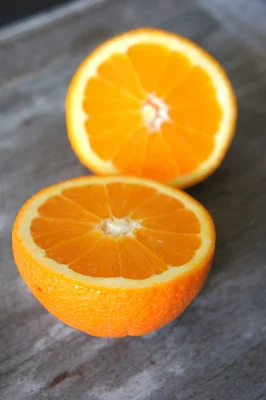Oranges: A Natural Source of Vitamin C and Immune-Boosting Benefits
The Arabic word (orange) is believed to be derived from the word (Portugal), since the Portuguese were the first to bring the cultivation of its trees from India to the regions of South Africa during their exciting sea voyage, while most experts believe that China is the original home of this delicious nutritious fruit. This opinion is supported by a Chinese study dating back to about 2200 years BC, which says that the people of southern China ate oranges and tangerines since ancient times, and they were the first to know their nutritional and therapeutic benefits, as they used its peels and flowers to treat several different diseases. It is believed that the people of China used to export orange trees before the beginning of the Christian era to India, Japan, the Malay Islands, and others. Then its cultivation was transferred by the Portuguese around the eighth century AD to Egypt, Palestine, Lebanon, and Syria, and from there to the countries of southern Europe around the beginning of the fifteenth century during the Crusades.
Nutritional benefits
The pulp of the fruit is sweet in taste and its juice is delicious, moisturizing and nutritious. Every 100 grams of oranges contains about 86% water, 0.6% protein, 1% fat, 12% carbohydrates, which give the body about 55 calories, vitamin A (100 IU), vitamin B1 (thiamine) 0.07 mg, vitamin B2 (riboflavin) 3 mg, vitamin B B (niacin) 0.2 mg, vitamin C 45 mg, and minerals, the most important of which are potassium citrate, 33 mg calcium, 0.4 mg iron, 33 mg phosphorus. One study showed that orange trees that grow with the help of chemical fertilizers have a lower percentage of vitamin C. It has also been scientifically proven that eating one medium-sized orange after a meal greatly helps in easy and quick digestion due to the effectiveness of orange acid in increasing the activation of stomach secretions, especially increasing the percentage of pepsin yeast, in addition to the fact that eating oranges greatly helps in stimulating the appetite.
Therapeutic properties
Medical observations have confirmed that oranges fight harmful bacteria in the body and help speed up the healing of infections, wounds, and regulate blood fluidity. They are also one of the most important means of treating scurvy, typhoid, most respiratory infections, and colds. Oranges have the ability to lower fevers and significantly reduce bleeding, as well as protect the body from high cholesterol levels in the blood and combat obesity.
It is prescribed to treat cases of
Fever, respiratory infections, digestive, liver and circulatory disorders, nervous spasms, dysentery, obesity, high blood lipids, poor skin vitality, diabetes.
Internal use
For severe colds, respiratory infections and flu... eat oranges or fresh orange juice, sweetened with a little honey, if available, to increase the therapeutic effectiveness.
To combat obesity, boil slices of a large orange with three lemons in two cups of water for ten minutes. Then add two tablespoons of honey to the boiled mixture and boil the mixture again for five minutes. Filter it and leave it to cool. The appropriate daily dose is one cup in the morning and another half an hour after lunch.
For cases of atherosclerosis and high blood fats, the Egyptian researcher Dr. Nemat Zakaria, a pharmacology teacher at the National Research Center, has come up with a way to enjoy food while maintaining blood cholesterol levels. The method is to eat the equivalent of 12 grams of powdered white orange peel daily. Her laboratory experiments confirmed that this peel is very rich in pectin, which helps absorb fatty substances that enter the body, and that it acts as a cover for these fats and expels them from the body before they are absorbed.
The Egyptian researcher was also able to make a new drink consisting of orange peel powder, adding it to the orange powder itself to give it an acceptable taste (50% of the amount of orange peel powder + 75% of the orange powder). This drink gave great results in maintaining the level of cholesterol in the blood, and experiments proved that this drink reduced the level of cholesterol in the blood to about 50%.
External use
To clean and freshen the skin, mix two tablespoons of orange juice + one egg yolk + one teaspoon of sweet almond oil. Use the mixture as a mask for the skin of the face and neck, then remove with lukewarm water after about 20 minutes.
To clear the skin and increase its vitality, place orange slices directly on the face and neck, taking the best relaxing positions for no less than 20 minutes. Then remove the slices and massage the skin with them for two minutes, so that the face is not washed until at least half an hour has passed.
To combat facial wrinkles, apply orange juice to the face and neck, then cover the skin with rings of orange slices, except for the area around the eyes and nose. Leave the mask on for 15-20 minutes, then remove with cold water.













0 Comments